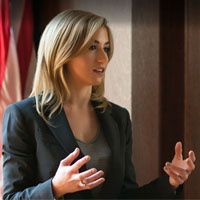Media Misdemeanor Lawyer, Pennsylvania
Sponsored Law Firm
-
 x
x

Click For More Info:
-
Christofer C. Johnson, Esq.
1500 Walnut Street Suite 2000 Philadelphia, PA 19102» view mapCriminal Defense Experienced Criminal Defense Lawyer
Christofer C. Johnson, Esq. has a track record of successful case outcomes and provides legal counsel for a reasonable price.
800-694-1771
Zak Taylor Goldstein
✓ VERIFIEDCriminal, Felony, Misdemeanor, DUI-DWI, White Collar Crime
Philadelphia Criminal Defense Attorney
Zak Goldstein is a Philadelphia criminal defense and civil rights attorney. Zak Goldstein has experience trying hundreds of cases before judges and ju... (more)
Lauren A Wimmer
✓ VERIFIEDCriminal, Police Misconduct, Felony, Misdemeanor, DUI-DWI
Philadelphia Criminal Defense Lawyer
Attorney Lauren A. Wimmer has represented individuals charged in both state and federal court with charges ranging from misdemeanors like drug and var... (more)
Michael J. Malloy
Child Custody, Misdemeanor, Criminal, Identity Theft
Status: In Good Standing Licensed: 48 Years
Arik T. Benari
DUI-DWI, White Collar Crime, Misdemeanor, Felony
Status: In Good Standing Licensed: 24 Years
FREE CONSULTATION
CONTACTBarry Wilson Van Rensler
Tax, Landlord-Tenant, Estate, Misdemeanor
Status: In Good Standing Licensed: 51 Years
 Christofer Johnson Philadelphia, PA
Christofer Johnson Philadelphia, PA AboutChristofer C. Johnson, Esq.
AboutChristofer C. Johnson, Esq. Practice AreasExpertise
Practice AreasExpertise



